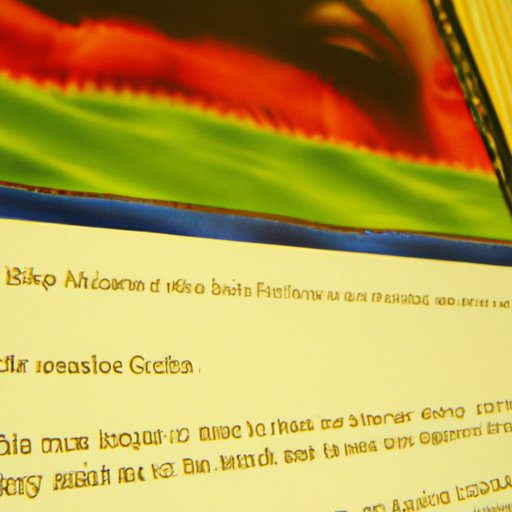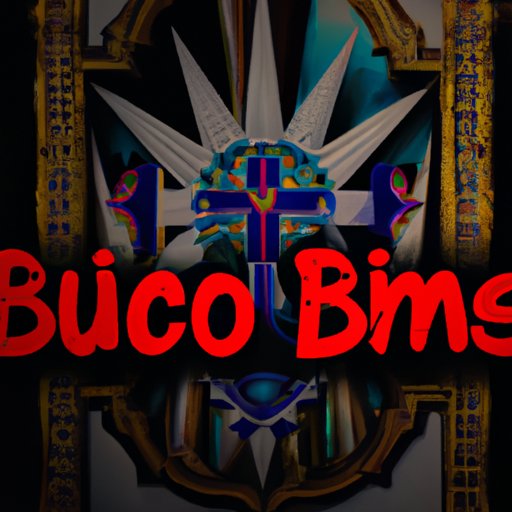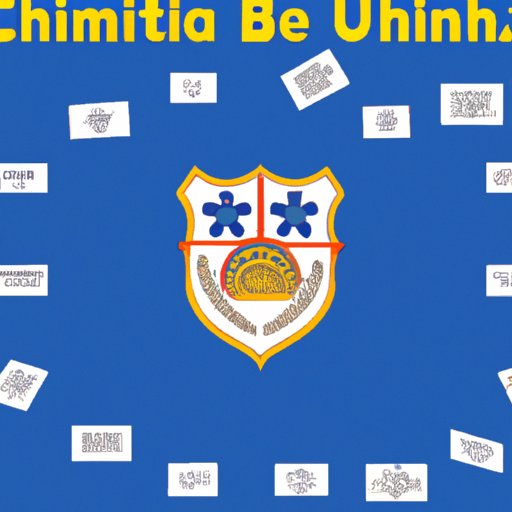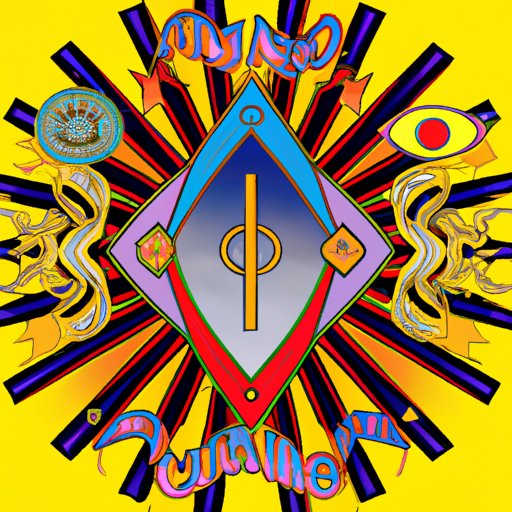Introduction
Chicano culture is the traditional culture of Mexican-Americans living in the United States. It is rooted in the heritage of indigenous and Spanish people who have lived in the area for centuries. The novel Bless Me Ultima, written by Rudolfo Anaya, is a classic example of literature that explores Chicano culture. In this article, we will analyze how Chicano culture is portrayed in Bless Me Ultima, as well as how it influences identity formation.

Analyzing the Chicano Cultural Representation in Bless Me Ultima
Bless Me Ultima follows the story of Antonio Marez, a young boy growing up in a small New Mexico town during the 1940s. His parents are of Mexican descent, and he is surrounded by the traditional values of Chicano culture. Throughout the novel, Anaya explores several themes related to Chicano culture, including family, religion, and identity. He also incorporates elements of superstition and magical realism into the story, which serve to highlight the unique beliefs and customs of the characters.
Anaya also uses a variety of symbols to represent Chicano culture in Bless Me Ultima. These symbols include the river, the golden carp, the owl, the Virgin of Guadalupe, and the Virgin de los Nueve Dolores. Each of these symbols has its own special meaning and helps to illustrate the deep connection between Antonio and his cultural heritage.

Exploring the Symbolic Significance of Chicano Culture in Bless Me Ultima
One of the most powerful symbols used in Bless Me Ultima is Antonio’s dreams. Throughout the novel, Antonio has a series of prophetic dreams that offer insight into his past, present, and future. These dreams are often interpreted as messages from God, and they provide Antonio with guidance on his journey of self-discovery. They also represent the power of faith and the importance of spiritual growth in Chicano culture.
Another important symbol in Bless Me Ultima is the curandera, Ultima. She is a wise healer who serves as a spiritual guide for Antonio. Her role in the novel is significant because she is the embodiment of traditional Chicano culture. She teaches Antonio about the power of faith and the importance of respecting one’s heritage. Through her teachings, Antonio learns to embrace his identity as a Mexican-American.
There are also various other symbols found throughout the novel that represent Chicano culture. For example, the river is a symbol of life and renewal, while the golden carp is a symbol of strength and resilience. The owl represents knowledge and wisdom, while the Virgin of Guadalupe is a symbol of faith and hope. Lastly, the Virgin de los Nueve Dolores is a symbol of suffering and redemption.
Investigating the Portrayal of Chicano Identity Through Antonio’s Journey in Bless Me Ultima
Throughout the novel, Antonio finds himself struggling to navigate his Mexican-American identity. He is constantly torn between two worlds: the traditional values of his family and the modern values of his peers. This struggle is reflective of the Chicano experience, as many Mexican-Americans at the time were trying to reconcile their cultural heritage with American society.
As Antonio embarks on his journey of self-discovery, he faces many obstacles. He must confront his inner demons and learn to accept both his Mexican and American identities. Through his relationships with his parents and peers, he begins to understand the importance of embracing his culture and finding his own path in life.
The novel also highlights the struggles faced by Chicanos in American society. Antonio is forced to deal with racism and prejudice, as well as the economic hardships of poverty. These issues are representative of the challenges faced by many Chicanos in the 1940s, and they serve to illustrate the difficulties of being a Mexican-American in a predominantly white society.
Comparing and Contrasting Chicano Culture in Bless Me Ultima to Modern Day Latinx Societies
While there are many similarities between Bless Me Ultima and current Latinx cultures, there are also some key differences. For example, in the novel, the traditional values of Chicano culture are highly emphasized. The importance of family, religion, and respect for one’s heritage are all central themes. On the other hand, in modern day Latinx societies, these values may not be as prominent.
In addition, the roles of women in Chicano culture have changed over time. In the novel, women are often portrayed as subservient to men. However, in modern day Latinx societies, women are often seen as strong, independent figures. This shift in gender roles is reflective of the changing dynamics of Latinx societies.
Finally, the portrayal of violence and poverty in the novel is very different from what is seen in modern day Latinx societies. In Bless Me Ultima, violence and poverty are presented as part of the everyday life of Chicanos. In contemporary Latinx societies, however, these issues are not as prevalent.
Examining the Stereotypes of Chicano Culture in Bless Me Ultima
Bless Me Ultima contains several stereotypes of Chicano culture, such as the idea of machismo and the emphasis on Catholicism. Machismo is the belief that men should be strong and dominant, while women should be submissive and obedient. This stereotype is prevalent in the novel, as Antonio’s father is portrayed as a strict disciplinarian who expects his sons to follow his orders without question.
The novel also portrays Catholicism as the dominant religious belief of Chicano culture. This is evident in the way Antonio’s parents raise him, as they emphasize the importance of prayer and attending church. While Catholicism is an important part of Chicano culture, it is not the only religion practiced by Mexican-Americans.
Finally, the novel presents a stereotypical view of women in Chicano culture. Women are often portrayed as passive and powerless figures who have little control over their own lives. While this may reflect the reality of some Mexican-American households in the 1940s, it does not accurately portray the roles of women in contemporary Latinx societies.

Understanding How Bless Me Ultima Influences Chicano Identity Formation
Bless Me Ultima provides readers with an understanding of how family, religion, and culture can shape one’s identity. Through Antonio’s journey, the novel encourages readers to embrace their heritage and find their own path in life. It also emphasizes the importance of respecting one’s elders and learning from their experiences.
The novel also illustrates the struggles faced by Chicanos in American society. It highlights the racism and prejudices faced by Mexican-Americans, as well as the economic hardships of poverty. By showing these issues, the novel encourages readers to stand up for their rights and fight against injustice.
Finally, Bless Me Ultima emphasizes the importance of family in forming Chicano identity. Antonio’s relationships with his parents and peers help him to understand his cultural heritage and find his place in the world. The novel encourages readers to appreciate the love and support of their families, as well as the value of their cultural heritage.
Conclusion
In conclusion, Bless Me Ultima is an important novel that explores the traditional values of Chicano culture. Through its exploration of themes such as family, religion, and identity, the novel encourages readers to embrace their cultural heritage and find their own path in life. It also highlights the struggles faced by Chicanos in American society and serves as a reminder of the importance of respecting one’s elders and learning from their experiences. Finally, the novel emphasizes the importance of family in forming Chicano identity and encourages readers to appreciate the love and support of their families.
(Note: Is this article not meeting your expectations? Do you have knowledge or insights to share? Unlock new opportunities and expand your reach by joining our authors team. Click Registration to join us and share your expertise with our readers.)
